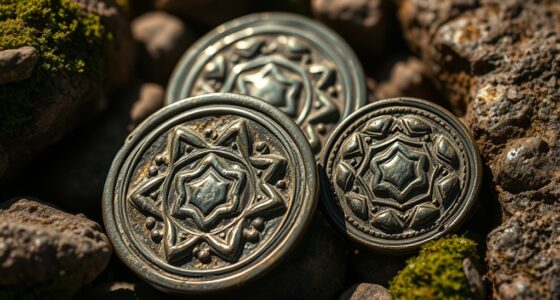In the medieval mindset, you see God’s will as law, made clear through signs in the stars and church teachings, guiding every decision. Fear of damnation drives morality, as sin condemn everyone without mercy. Honor, chivalry, and loyalty shape social conduct, while humility reminds you of human limitations. Knowledge is sacred, reflecting divine wisdom, and life’s fleeting nature urges you to focus on salvation. If you continue exploring, you’ll discover how faith and hope shaped this worldview even further.
Key Takeaways
- Medieval society viewed divine authority as the foundation of all power, with rulers and institutions reflecting God’s will.
- The human condition was dominated by fear of sin and divine punishment, emphasizing humility, repentance, and moral virtue.
- Concepts of honor, loyalty, and courtly love shaped social behavior, reinforcing moral codes like chivalry and virtue.
- Knowledge was sacred, preserved through manuscripts and rooted in divine wisdom, highlighting life’s transient nature and spiritual reflection.
- Faith and divine signs took precedence over reason, fostering hope for salvation and guiding moral and natural understanding.
Gods Will Is Law

Have you ever wondered how medieval societies justified their authority? They believed that everything, including rulers’ power, was rooted in divine providence. Medieval astrology played a key role, as people thought the stars and planets reflected God’s will. Leaders weren’t just chosen by human effort but were seen as instruments of divine decree. The idea was that God’s will was law, guiding everything from kings’ decisions to societal order. This belief reinforced the idea that challenging authority was like challenging God’s plan itself. By trusting in divine providence, they saw their rulers as divinely appointed, making obedience a moral duty. Therefore, medieval society viewed authority as sacred, with the divine will embedded in the very fabric of their understanding of the universe.
The Fear of Damnation
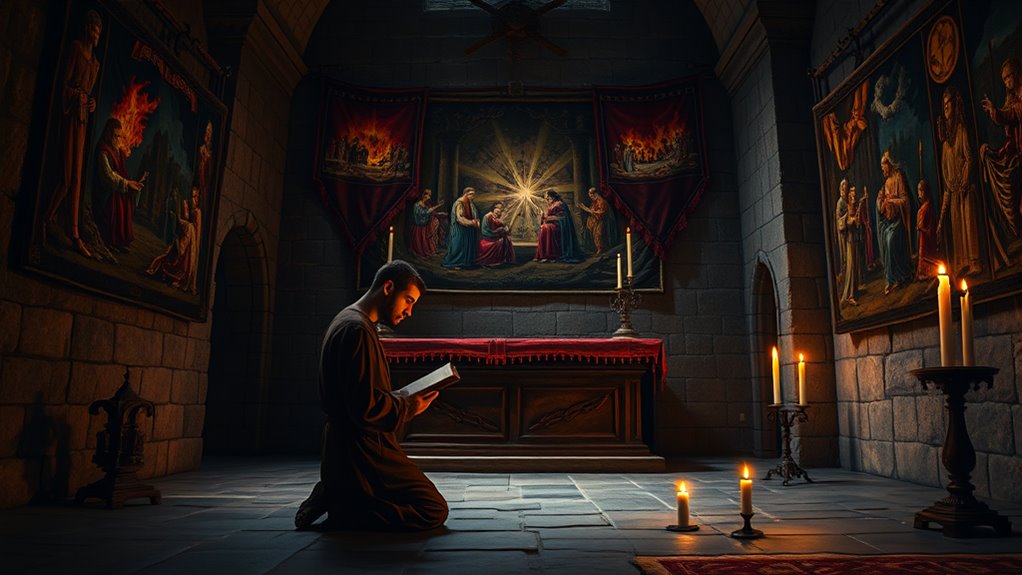
Why did medieval people live in constant fear of damnation? Because they believed human sinful nature condemned everyone to eternal punishment if they failed to seek God’s mercy. The threat of hell was ever-present, shaping daily life and moral choices. Scriptures warned that even minor sins could lead to eternal punishment, fueling anxiety and guilt. They saw sin not just as a mistake but as a barrier blocking salvation, making repentance essential. The church’s teachings emphasized that God’s justice was balanced by His mercy, but fear of divine wrath kept many in constant vigilance. This relentless fear motivated them to live righteously, avoiding sin at all costs, and constantly seeking forgiveness to escape the eternal punishment awaiting the unrepentant. Additionally, the emphasis on practical support such as community prayers and confessions helped reinforce their reliance on divine mercy to avoid damnation.
Chivalry and Honor

After the constant fear of damnation shaped medieval people’s moral lives, many sought a code of conduct that emphasized virtues like bravery, loyalty, and respect. Chivalry became the foundation of this code, guiding knights to act honorably. You’re expected to uphold knightly virtue, demonstrating courage in battle and integrity in daily life. Courtly love added a romantic dimension, urging knights to honor and serve their ladies with humility and devotion. These ideals reinforced social order and personal morality, making honor a core value. When you follow chivalry, you prioritize loyalty to your lord, respect for others, and a sense of justice. Your actions reflect a commitment to virtuous behavior, shaping how you are remembered and how you uphold the noble ideals of medieval society. Auditory processing challenges like discrimination and memory were also significant in understanding and maintaining social harmony during the period.
The Power of the Church
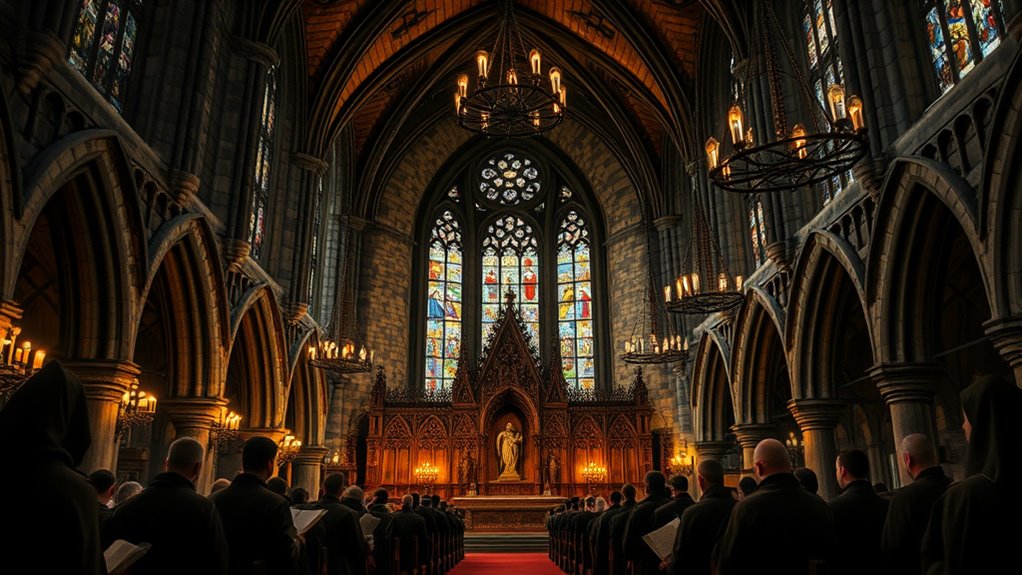
During the medieval period, the Church held immense power, influencing every aspect of daily life and governance. You’d see this dominance reflected in medieval art, which often depicted religious scenes and saints to inspire devotion and reinforce church authority. Church architecture reached new heights with grand cathedrals that symbolized divine power, drawing communities together and showcasing the Church’s influence. These structures weren’t just places of worship—they were statements of spiritual and political strength. The Church dictated moral standards, controlled education, and even influenced kings and rulers. You couldn’t escape its reach; it shaped perceptions of the world and justified its authority through art and architecture that elevated its role in society. The power of the Church was woven into every corner of medieval life.
Humility as Virtue

Humility teaches you to accept your human limitations and acknowledge that you are not above others. It also reminds you to recognize divine authority as the ultimate source of guidance. By embracing these truths, you cultivate a virtue that aligns your actions with humility’s deep wisdom. Incorporating protective styling benefits from various techniques can further reinforce the importance of understanding your own boundaries and strengths.
Embracing Human Limitations
Why is acknowledging our limitations considered a true virtue? In medieval education, recognizing human fallibility was essential to humility. It reminds you that no matter how much you learn or achieve, you’re still imperfect and prone to mistakes. Embracing human limitations fosters a sense of humility, encouraging you to seek wisdom beyond your own understanding. Medieval thinkers believed that accepting your boundaries keeps you grounded and open to growth. By acknowledging that you’re not omniscient, you avoid arrogance and remain receptive to guidance. This mindset aligns with the virtue of humility, helping you navigate life with honesty about your strengths and weaknesses. Additionally, understanding the concept of forsale 100 can serve as a reminder of the importance of humility in recognizing the value and limitations of material possessions. Ultimately, embracing your limitations cultivates a humble spirit, essential for true learning and moral development.
Recognizing Divine Authority
Have you ever considered how recognizing divine authority fosters true humility? In medieval justice, humans learned that ultimate power rested with divine intervention, not mortal rulers. Acknowledging this truth encourages humility because it reminds you that human efforts are limited, and true justice comes from divine will. When you accept divine authority, you see your role as part of a larger divine plan rather than a source of absolute power. This humility aligns with medieval ideals, where humility was essential for spiritual growth and moral integrity. Recognizing divine authority helps you accept your place in the divine order, fostering respect for divine justice over personal ambition. Embracing this perspective reinforces the importance of moral and social harmony, which rests on divine guidance rather than human dominance. It’s a crucial step toward understanding that divine intervention, not human might, ultimately sustains moral and social harmony.
The Significance of Superstition

Superstition played an essential role in medieval society, shaping everyday decisions and cultural beliefs. You would often rely on medieval astrology to interpret celestial signs, believing that the stars influenced your fate. Superstitious practices, such as avoiding certain numbers or performing specific rituals, aimed to ward off evil spirits or bad luck. Many thought that omens and portents could predict future events, guiding choices in agriculture, health, and even marriage. These beliefs reinforced a worldview where the supernatural intertwined with daily life, making superstition a practical necessity for many. People trusted these traditions, often ignoring rational explanations in favor of divine or mystical guidance. Overall, superstition was deeply embedded, serving as a bridge between the known and the mysterious forces believed to govern existence. Additionally, the widespread use of privacy and cookies in the digital age highlights the importance of managing personal data and consent in modern society.
The Value of Knowledge
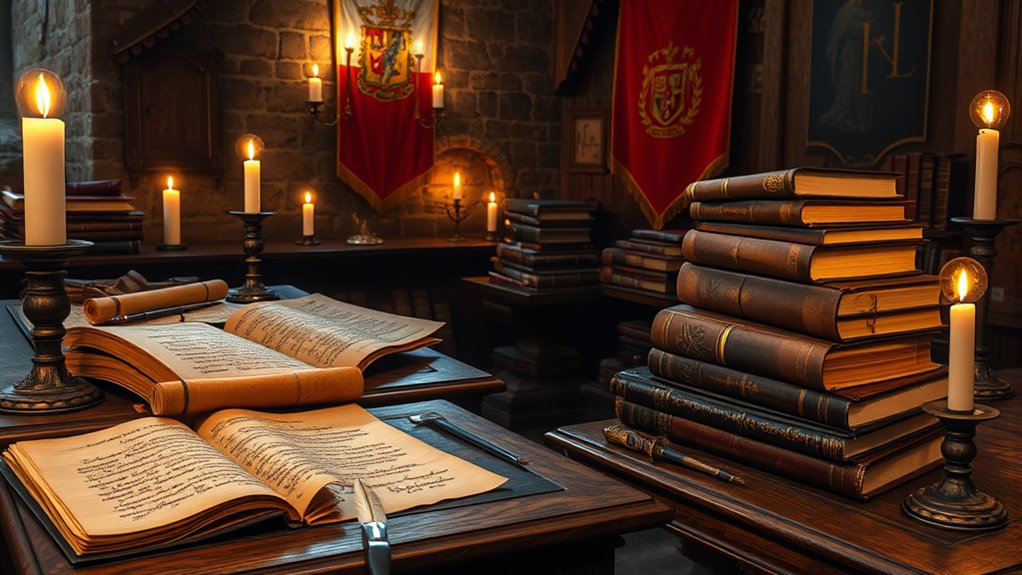
You recognize wisdom as a divine gift that elevates human understanding beyond mere survival. Monasteries and scholars work tirelessly to preserve manuscripts, ensuring knowledge endures through time. Hierarchies in learning emphasize the importance of mastering texts before contributing to the broader intellectual community. Recognizing the value of knowledge inspires continued dedication to education and the dissemination of wisdom.
Wisdom as Divine Gift
Throughout the Middle Ages, wisdom was viewed not merely as human achievement but as a divine gift bestowed by God. You believed that true knowledge came from divine inspiration, guiding knights and healers alike. In medieval medicine, divine wisdom was essential for healing, seen as a gift from God to restore health. This belief reinforced the importance of knightly virtues such as humility and piety, emphasizing that wisdom is not just acquired but granted by the divine will. You trusted that understanding of the natural world and spiritual truths was part of God’s plan, making knowledge sacred. Recognizing wisdom as a divine gift elevated learning beyond mere human effort, inspiring humility and reverence for the divine in all pursuits of knowledge. Studies indicate that divine gift plays a crucial role in how medieval thinkers perceived the acquisition and value of knowledge.
Preservation of Manuscripts
Why was the preservation of manuscripts so essential to the medieval understanding of knowledge? Because these texts contained the wisdom and teachings humanity valued. Illuminated manuscripts, with their intricate artwork, symbolized the importance of safeguarding knowledge’s beauty and accuracy. You realize parchment preservation was crucial; parchment was fragile and vulnerable to decay. Monks and scribes dedicated effort to carefully copy and preserve these manuscripts, understanding their role as treasures of learning. Losing them meant losing valuable insights from the past. The meticulous care given to illuminated manuscripts ensured that knowledge endured through centuries, enabling future generations to access the wisdom of antiquity. This commitment reflects a profound respect for learning, emphasizing that knowledge’s preservation was vital to cultural continuity and intellectual growth in medieval times. parchment preservation was especially important because it involved protecting delicate materials from environmental damage and decay.
Scholarly Hierarchies
Have you ever wondered how medieval scholars organized and valued knowledge? Medieval education emphasized a clear hierarchy, where certain texts and authorities held greater prestige. Scholars believed that knowledge was structured, with Aristotle and the Church at the top of the intellectual ladder. This hierarchy influenced how people approached learning, often prioritizing the works of revered masters over new ideas. Scholarly disputes were common, as debates challenged established authorities and reshaped understanding. These disagreements showed that knowledge wasn’t static but evolving within a framework that valued tradition. Your place in this hierarchy depended on your mastery of texts and your ability to interpret them within the accepted order. Ultimately, the medieval view saw knowledge as a carefully maintained system that reinforced social and religious stability.
The Transience of Life

The fleeting nature of life was a common reflection among medieval thinkers, who believed that nothing lasts forever. You see this in medieval art, which often depicts skulls and decaying figures as reminders of mortality. Funeral rites emphasize the transient existence we all share, focusing on preparing the soul for its journey beyond life. These rituals serve as a reminder that worldly possessions and status are temporary, urging humility and reflection. Medieval quotes frequently echo this idea, emphasizing life’s brevity and the importance of spiritual readiness. By contemplating death and decay, you’re encouraged to live meaningfully, knowing that life’s beauty is fleeting. This awareness shapes a mindset that values the eternal over the temporary, urging you to focus on what truly matters.
Faith Over Reason

In medieval thought, faith often took precedence over reason as a guiding principle for understanding the world and divine truth. You’re encouraged to trust divine intervention rather than rely solely on logic or empirical evidence. Medieval superstition reinforced this mindset, suggesting that supernatural forces directly influenced everyday life. People believed that miracles and divine signs confirmed the presence of God’s will, making reason secondary in seeking truth. This perspective prioritized spiritual authority, often dismissing scientific explanations. When faced with uncertainty, you’d turn to faith, trusting that divine power would reveal what reason could not. This approach shaped how medieval society understood natural phenomena and moral questions, emphasizing divine authority over human inquiry. Faith became the lens through which the world was interpreted.
Hope in the Afterlife
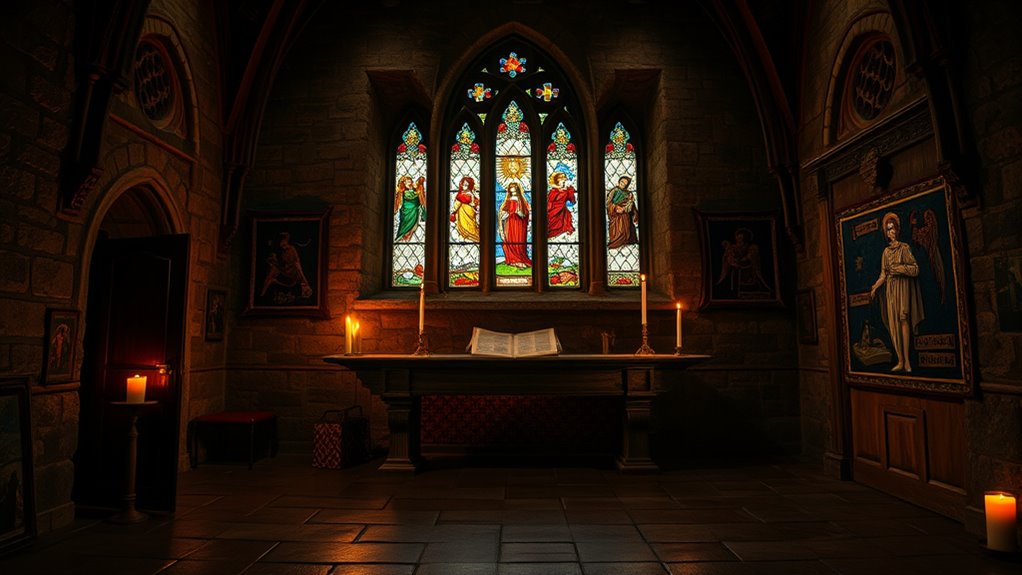
What drives medieval people’s outlook on life beyond death is a profound hope in the afterlife. Their afterlife beliefs center on the promise of salvation and eternal reward for faithful living. You are encouraged to live righteously, trusting that your actions will influence your fate after death. The hope for salvation sustains them through hardships, reinforcing the idea that death is not the end but a passage to paradise or hell. Medieval quotes often highlight this optimism, emphasizing divine judgment and the importance of spiritual preparedness. You believe that by adhering to religious teachings, you secure a place in heaven, making hope in the afterlife a powerful motivator to live morally and seek divine grace.
Frequently Asked Questions
How Did Medieval People View Scientific Discoveries?
You might see that medieval people often viewed scientific discoveries through the lens of medieval astronomy, which was deeply influenced by religious beliefs. The church versus science debate was common, with many fearing that new ideas challenged their understanding of God’s creation. Some embraced discoveries if they aligned with faith, but others remained skeptical or resisted change, fearing it threatened spiritual authority and the established worldview.
What Role Did Women Play in Medieval Spiritual Life?
You see, women in medieval times often played a crucial role in spiritual life, despite strict medieval gender roles. Many women gained spiritual authority as nuns, mystics, and patrons of religious institutions, shaping religious practices and ideas. Some, like Hildegard of Bingen, were recognized for their spiritual insights. You’d notice that women’s spiritual authority challenged societal norms, showing they could influence religious and cultural life beyond traditional expectations.
Were Medieval People Skeptical of Religious Authority?
You might think medieval people fully trusted church authority, but many were actually skeptical, especially with widespread medieval superstition. They questioned how much the church truly understood and whether its teachings aligned with everyday life. Some challenged church authority openly, while others secretly doubted, blending faith with superstition. This mix of trust and doubt shaped their spiritual practices, showing that medieval minds weren’t entirely convinced by religious authority alone.
How Did Common Folk Interpret These Quotes Daily?
You see, common folk interpreted these quotes through their daily experiences, blending popular superstitions and folk remedies to make sense of life’s uncertainties. They believed in the power of charms, prayers, and rituals, trusting these over official religious authority. These quotes reinforced their beliefs, guiding actions like protecting crops or curing illnesses. For them, faith in traditional practices overshadowed formal doctrine, shaping their understanding of the world around them.
Did These Beliefs Vary Significantly Across Different Regions?
Imagine the medieval world full of whispers and shared beliefs—did these ideas differ much across regions? You’d find regional differences and cultural variations shaping how people perceived their world, religion, and morality. While core beliefs remained, local customs and influences added unique flavors. So, yes, beliefs varied markedly, creating a patchwork of perspectives that reflected the diverse medieval landscape. Your understanding deepens as you see how geography shaped mindsets everywhere.
Conclusion
You can see how these medieval mindsets gently guide your understanding of the past, like whispers from a long-forgotten era. Their beliefs shape the way they saw the world, offering lessons wrapped in tradition and faith. As you explore these quotes, you might find echoes of your own hopes and fears, reminding you that even in the shadows of history, the human spirit quietly endures, longing for meaning beyond what’s seen.


